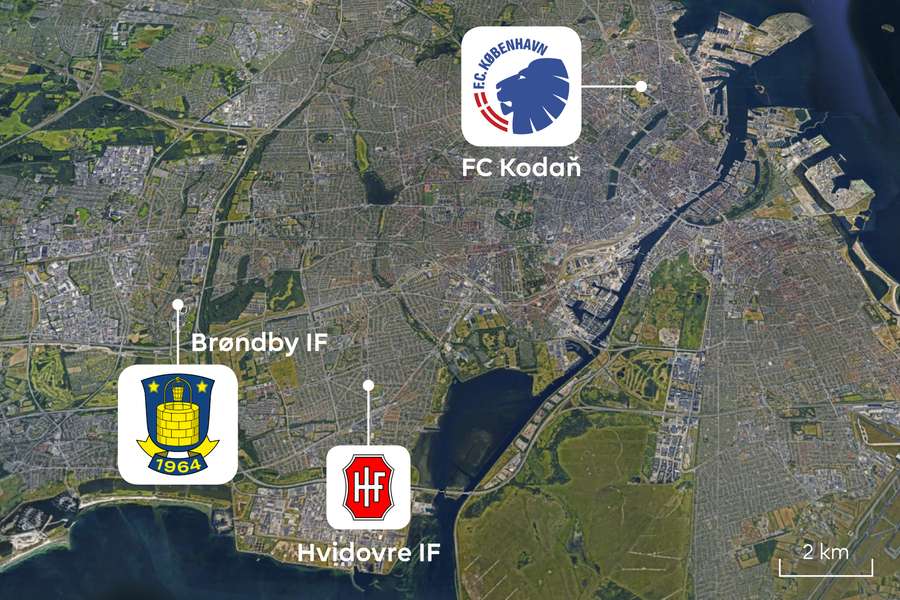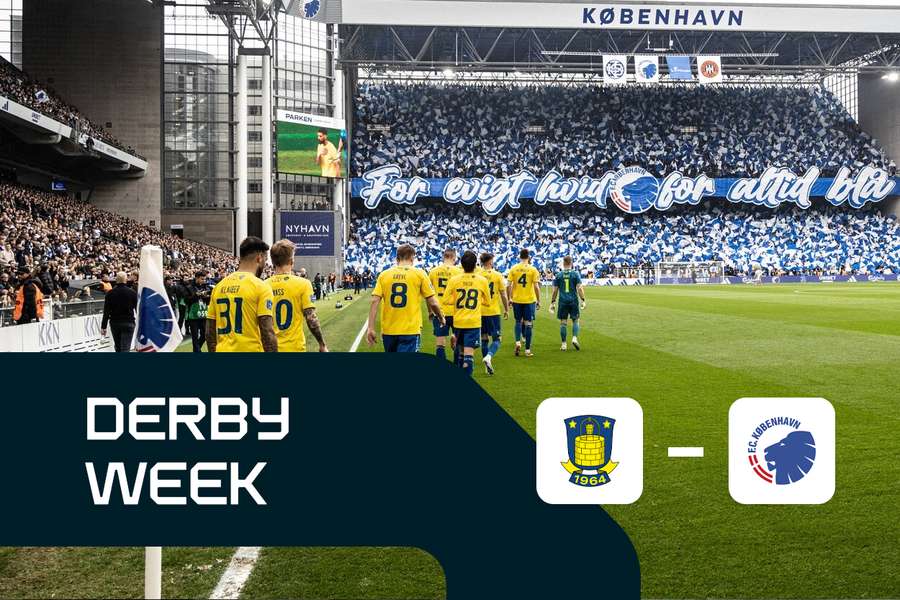FC Copenhagen: Success encoded in the DNA
FC Copenhagen was only founded in 1992, but its foundations are based on a tradition that was already more than a century old. It was in fact formed by the merger of two traditional clubs, Boldklubben 1903 and Kjøbenhavns Boldklub (KB), who found themselves in problems.
The name of the former makes it clear how long the club has been around. KB have even deeper roots, even the deepest. Indeed, Kjøbenhavns Boldklub, founded in 1876, was the oldest football club in continental Europe outside the British Isles. Both predecessors had given the newly formed team a winning gene in addition to tradition.
Boldklubben 1903 won seven titles and KB won it 15 times. So on the day of its foundation, FC Copenhagen already had 22 league titles in their cabinet. Since their inception, FC Copenhagen have won 15 leagues. They have been destined for success thanks to the fact that they had a great home from the start in the form of the modern national stadium Parken, which opened 32 years ago.
Brøndby: The Laudrup family club
Brøndby IF is a relatively young club, but it also stands on old pillars. It was formed in 1964 by the merger of two clubs whose history dates back to the early 20th century. In the case of Brondby IF, the establishment of a new, larger club was one of the main prerequisites for the construction of a new stadium, which was named Brøndby Stadium.
Unlike FC Copenhagen, who began in the top division and were able to reign over Danish football right from the start, IF had to work its way to success, clawing its way to the top from the sixth division. They reached the top division for the first time in 1981, with Danish international Finn Laudrup playing a big part.

He also brought his two (very talented, it should be noted) sons to Brøndby IF. Their names were Michael and Brian. Both of them played in the first team of Brondby IF before going on to have great careers at big clubs abroad.
Michael Laudrup, later proclaimed as the best Danish footballer of all time, also returned to Brondby as coach (2002 to 2006). Other famous names such as goalkeeper Peter Schmeichel, goalscorer Bent Christensen and goalkeeper Lars Olsen are linked to the success of the club, and Danish football as a whole.
These three, as well as other players from Brondby, made history when the Danes surprisingly won Euro 1992 (Michael Laudrup was absent from the tournament due to disputes with the national team coach).
The fight on the pitch, in the stands and in the city
FC Copenhagen and Brondby IF are similar in the way they were founded, with the construction of a new stadium associated with them. But that is the end of the list of similarities; in many ways, they are completely different.
FC Copenhagen is associated with a wealthier social class, being quite central to the Danish metropolis. IF is based in the town of Brondbyvester, located on the outskirts of the Copenhagen conurbation, and has traditionally been supported by a wider society with a working-class core.
Brondby IF's fan base is also more diverse geographically. While FC Copenhagen has a fanbase mostly confined to Copenhagen, you would find Brøndby IF supporters in rural areas and other cities, even in more remote parts of Denmark.
The Battle of Copenhagen is always accompanied by a great, though sometimes very tense, atmosphere. This season, FC Copenhagen dominated the first match (3-2), turning the game around with two goals in the last minutes.
The second ended goalless, while Brondby managed to win the third (2-1). The last Battle of Copenhagen of the season is a proper title fight. Will Brondby IF dethrone the reigning champions and arch-rivals? The match kicks off on Sunday, May 12th at 16:00 CET.
Next derby of the week
Friday, May 10th
Mexico - Liga MX
Tigres de la UANL - CF Monterrey
Clasico del Norte
The rivalry between Tigres and CF Monterrey is the biggest in all of northern Mexico, and both clubs are the strongest far and wide. Monterrey is a large metropolitan area with over five million inhabitants. It includes, among others, Guadalupe, where CF Monterrey has a stadium (the beautiful Estadio BBVA will be one of the host stadiums for the 2026 World Cup), and San Nicolás de los Garza, which is home to Tigres. The Clásico del Norte will take place as part of the quarter-final play-offs. The first match is played on Friday, followed by the rematch on Monday.
Ireland - Premier Division
Shamrock Rovers - St. Patricks
South Dublin derby
The rivalry between Dublin clubs Shamrock Rovers and St. Patricks has only been growing in recent years. This is because Shamrock Rovers, Ireland's most successful club, moved in 2009 to the new Tallaght Stadium in the south of the capital, where St. Patricks used to dominate football.
Ireland - First Division (2nd League)
Cork derby
Outside of Dublin and Louth, Cork is the only county in Ireland to boast First Division clubs. The small town of Cobh lies just 15 kilometres from the larger Cork, after which the entire county in the south of Ireland is named. The derby occurs in a competitive match after two years, as Cork City was relegated from the top flight to the second tier in 2023 (Ireland's spring-autumn system), in which Cobh has been a long-time fixture.
Saturday, May 11th
Scotland - Premiership
Old Firm derby
Rangers were formed in 1872, the other of Glasgow's big clubs, Celtic, was founded "only" in 1887. The first mutual match was in 1888. Over time, the two became huge rivals and their derbies came to be known as the Old Firm derby, which could be translated as the Derby of the "Old Friends". Currently, the Scottish top flight has the last three rounds on the schedule, with Rangers three points behind Celtic.
Ukraine - Premier League
Shakhtar Donetsk - Dynamo Kyiv
Klasycne derby
Dynamo and Shakhtar are the two biggest football clubs in Ukraine. For over 30 years, since the Soviet Union collapsed and Ukraine became an independent republic, no one else has won the local league. Their matches against each other are the annual highlight of the season. But alongside the battle of the football giants, it is also a battle between the capital Kiev and the industrial region in the east of the country - Donbas. We wrote more about the Classic Derby in Derby Week in the autumn.
Czech Republic - Fortuna Liga
Prague "S" Derby
The so-called Derby of Prague "S", the two best Czech clubs Sparta and Slavia, will take place for the fourth time in the current season. All three previous seasons ended in a draw in normal time (Sparta won the cup match after extra time). Now the two rivals will meet in the extra group for the title.
Slovenia - Prva liga
Vecni derby
The rivalry between the traditional Slovenian sides came to life in 2009, when Olimpija managed to fight their way back into the top flight after years of existential hardship. Since then, it has even won the title three times and is the reigning champion. Maribor is the most successful club in Slovenia with 16 titles, but at the moment the Eternal Derby will be a battle for second place. The Slovenian champion this year is Celje.
Portugal - Primeira Liga
About Derbi do Minho
Guimaraes and Braga are the two largest cities of the Minho region in the north of Portugal. They lie just 20 kilometres apart and are rivals from a historical point of view. The rivalry between them carries over onto the football pitch. Moreover, both protagonists are very successful clubs by Portuguese standards. In the penultimate round of the season, the derby will also be played for a ticket to the European Cup.
Sunday, May 12th
France - Ligue 1
Derby de l'Est
The rivalry between Strasbourg and Metz stems from the sporting competition, with both clubs having similar quality in the long term, but also from the shared history of the two cities. Before the First World War, Strasbourg and Méty were German cities in the German state of Alsace-Lorraine. Currently, the two cities (separated by 130 kilometres) are the capitals of two French departments in the north-eastern part of France. With the last two rounds of Ligue 1 remaining, FC Metz are fighting for salvation.
Portugal - Primeira Liga
About Derbi do Porto
Portuguese football is dominated by the "big three". Historically, one of the trio of Benfica, Sporting, FC Porto has won every edition of the top competition there. With two exceptions. One of them is the title of the smaller of the two Porto clubs, Boavista, in 2001. The Porto derby is a David and Goliath match with all the trimmings.
Paraguay - Primera División
Cerro Porteno - Olimpia Asunción
El Clasico del futbol Paraguayo
The El Clasico of Paraguayan football is a battle of the most successful clubs with the largest fan base spread across Paraguay. They are Cerro Porteño and Club Olimpia, both based in the capital city of Asuncion. Since 1913, the two clubs have played 453 matches against each other.


